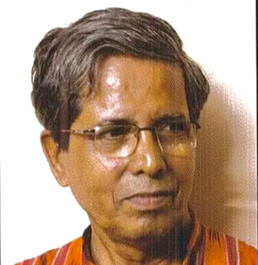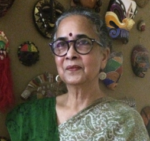Translated from the Bengali by Shamita Das Dasgupta
Banana leaves are still wet with dew that drips like tears from an eye. The morning birds are still cocooned in the warmth of their nests.
Ma gets up soon after. She is wearing a red bordered sari – the part covering her head is drooping low on her face.
She can’t wait any longer. She’ll have to leave now or she won’t get a space. Azimpur is quite far away. From there to Nilkhet and then, Romna. And from Romna, where? She can’t think any longer. The tint of cottontree flowers, fragrance of grapefruit blooms, intoxication of flamboyants, render her restless.
… The place is covered in lotus, rose, flame of the forest, and honeysuckle petals. Throngs of people pack every open space. They carry garlands and conch shells in their hands.
No one is speaking. The eyes of the silent, dazed people shine with inner lights.
“… Shush! Take her away please.”
A woman with a child on her body leaves at the crowd’s admonition.
“Please let me in… just let me pass. I want to be near them.”
A little excitement spreads through some. The rest of the floating mass remains voiceless, impassive, nearly meditative.
“Ma is here… Ma…a…a!”
Ma stands with the people – near the front. Her eyes are distant, remote. She stands at the head of a mute bay of people.
Someone approaches leaning on a crutch. His undulant dark hair shows silver strands. The man who is sliding toward life’s afternoon, whimpers in blue agony.
“Why did they give me the slip?”
He points at the area of scattered flowers.
“That’s my place – look at me! Just look! My leg bears witness!”
His eyes become moist. The crowd comes to life.
“Hush! Be silent! Just watch, Ma is here!”
Again, the stillness of fallen leaves permeates the place. The gathering becomes silent – again.
Clouds drift across Ma’s face. She looks up and sees the roses. She senses the frolic of night jasmines on the laps of red roses.
She hears the sounds of the reading of Fatiha.[i] Her close sense of her beloved language drops many a question in her mind. She is restive like a gushing river. The gathered people sing in unison, “They want to take away our words…”
Someone sobs out a melody: “Oh Bengali, you struggled for your language… oh, you… you stretched the city of Dhaka… then you dyed the city with your blood…!”
Ma is trembling – her legs quaver. Her head-covering tumbles. A spring breeze rumples her hair. A southernly wind displaces the keel petals, honeysuckle, lotus, and rose flowers.
People continue to worship with their songs. “Oh Bengali… you lost your life to cherish a parrot’s voice!”
A kite of blood-spattered memories circles overhead. Rain-filled dark clouds within Ma shed their tears. Ma loses control, becomes dizzy.
She mumbles, “Flames of the forest were abloom that day. Red roses tinged their hearts. The day was wet with their blood…”
The crowd sang, “My brothers’ blood…”
Ma croons, “Yes, sing… sing all of you… ‘our pride, our hope…’”
Ma’s parched eyes house a spate. She wipes her eyes with the end of her sari. The contours of her countenance harden. Her eyes are ablaze. Her right fist shoots up and reaches the sky. Her voice rings out like Prometheus.
“No-o-o-o-o, do not forget. Don’t forget my fallen children…. My Barkat, Salam, Rafik, Jabbar, Abdul, Shafik… They are standing by you. And remember my daughter… Roshanara… your sister! They’re still holding onto hope. This sh-ha-da-t[ii] must not be in vain!”
On the morning of 21st February, Azimpur cemetery in Dhaka stirs anew and sits up.
Author’s Note:
Please don’t take this as a short story. I don’t claim this is a story. The 1952 movement to preserve our mother-tongue, Bengali and for self-determination, is now a page in world history.
Then contemporary East Pakistan Administration’s desperate efforts to establish Urdu as a state language brought out thousands of Bengalis on the streets to protest the law. On the 21st of February, under the leadership of Gajiul Haque, students defied the rule prohibiting public gatherings[iii] and marched in force. The police began by arresting peaceful protesters and then opened fire indiscriminately. Along with Abul Barkat, Abdul Jabbar, Rafikuddin Ahmed, Abdul Salam, and Roshanara, many others were shot dead.
Abdul Salam was not a student but worked in a printing-press. People of all classes and professions supported and joined the students in their struggles.
At the end of the day of 21st February, a horrific act of mass murder transpired in Dhaka. At the orders of the county magistrate of the time, Qureshi, wholesale firing on marchers took place. The martyrdom of Salauddin and so many others, in honor of a nation’s mother-tongue, remains a singular chapter in world-history.
The United Nations marks this day as the International Mother Language Day.
Due to the movement of 21st February, the Government of Pakistan was compelled to accept Bengali as a state language.
The movement of the 21st February also motivated the renewal of Bengal’s cultures. Bengali language now has a homeland. Each year, as this particular day of the year rolls in, Bangladesh’s skies mourn the martyrs at the tune of: “21st February is awash with my brother’s blood – how can I ever forget it!”
The lyrics were written by Gaffar Chaudhury. The movement to reclaim the Bengali language is the precursor to Bangladesh’s freedom movement.
[i] Reading of the name of Allah.
[ii] Death of a martyr.
[iii] Sec. 144 of Criminal Penal Code is a law that imposes curfew and restricts public gatherings. It has generally been utilized in South Asian countries to stop protests against the ruling administration.



























It’s a beautiful narrative presentation. The writer pays homage to the international mother language day with a very special artistic paragraph. I like to read the original bengali version of this paragraph.
Translation is praiseworthy.
Beautiful. This is a short story without a story. Better to call it a glimpse of history concerning love for mother tongue. The translator deserves praise for beautifully capturing the essence of the original piece of writing. She is more praiseworthy for choosing the writing of an author whose name is not so familiar with the readers.
The essence and emotions of the incident and the impact of such events in history are summarize in a alluring and a definitive manner making the prose quite emotionally attaching to the concept of revolution against oppression that is even relevant today.
Narratives like these often reminds us that sometimes or rather most of the times push back is necessary and mandatory against radicalization and of instances where people have bled and died to keep their identity and belief alive.
Very rarely do we Bangalis find memoirs of our history. There have been plenty revolts against tyranny and colonisation but rarely do we witness a revolution whose sole cause was to protect our mother-tongue. This piece really dwelves into the strong emotions and fates that were sacrificed for this fight. Beautifully written and translated. Kudos to you both!
To understand russian revolution reading Mother is essential.may not be to that greatness but a mother anywhere heralds a change.mother should not be pitied.
This is short story which awakend our old memories
and once again remind to
our our mother land as well as
our mother languge.
My regards to joyti da and also
to the translator.
শমিতা দাশগুপ্তা এই লেখাটি অনুবাদের জন্য চয়ন করায় তিনি প্রশংসনীয়া। অনুবাদটি অসাধারণ-
এই লেখাটি গল্প নয়- লেখাটি আন্তর্জাতিক ভাষাদিবস ২১ ফেব্রুয়ারীর, শহীদদের জন্য লেখকের অশ্রুশিক্ত তর্পণ।
লেখাটি বিষয় গৌরবে গৌরবান্বিত, প্রকাশে কাব্যিক ও মর্মস্পর্শী। স্বাভাবিক ভাবে সন্তান পিতামাতার মৃত্যুর পর তাঁর স্মৃতিতে তর্পন করে।
এই লেখায় ২১ ফেব্রুয়ারীর ভোরে বাংলাভাষার শহীদ সন্তানদের স্মৃতি তর্পণে এসেছেন-মা-ভাষা মা।
মুহূর্তে জেগে উঠেছে ঢাকার আজিমপুরের কবরস্থান।
এই লেখকের জীবন ও সাহিত্য দুইই অন্যায়ের প্রতি তীব্র প্রতিবাদ ও মানব কল্যানে নিবেদিত।
লেখকের দুটি অসাধারণ উপন্যাস কুমারী নদী ও সুখচাঁদ-আমি পেড়েছি। সুখচাঁদ লিখতে লেখককে যথেষ্ট সাহস ও নির্ভীকতার পরিচয় দিতে হয়েছে।
My heartfelt thanks to all of you who have found my translation acceptable. I am truly grateful to you for supporting my work. Thanks to Mr. Jyotirmoy Mandal for writing this beautiful piece. আপনাদের সবাইকে আমার আন্তরিক কৃতজ্ঞতা জানাচ্ছি।